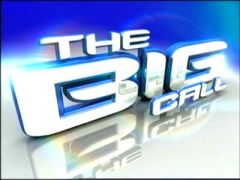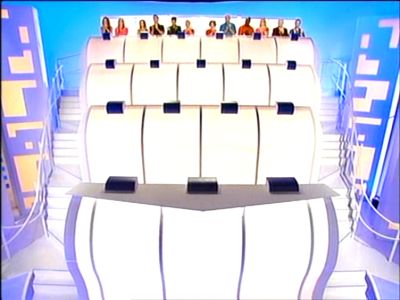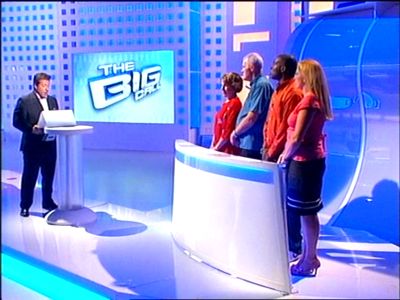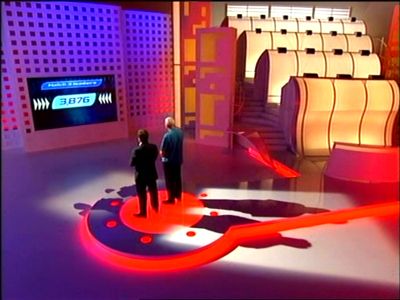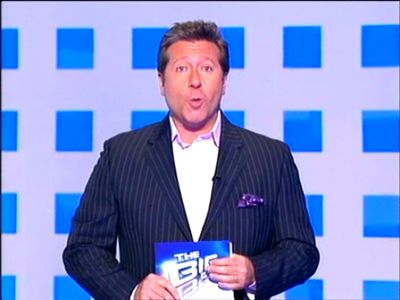The Big Call
Contents |
Host
Co-hosts
Maths boffin: Professor Geoffrey Grimmett of Cambridge University
Announcer: Peter Dickson
Broadcast
Granada for ITV1, 18 June to 30 July 2005 (6 episodes in 1 series)
Synopsis
For God's sake, haven't we suffered enough? After all the Lotto formats on the BBC, now ITV have (give us your money) decided to get in on the act with their own version.
Obviously it's flown under our radar, but clearly it's now legal and possible to bulk buy shed loads of tickets for the Lotto draw from Camelot. In this case, it's 100,000 tickets for the Saturday draw up for grabs - a £100,000 prize in effect. However, since only half of the take goes into prize money, effectively you're expecting £50,000 back. And because so much of that goes into the jackpot figure, in fact you're most likely (give us your money) to get around £25,000 with only a 1-in-140 chance of hitting the jackpot.
Instead of taking the tickets, you can take a guaranteed cash prize of... £20,000. Therefore, you have to make the Big Call between £20,000 guaranteed or, erm, roughly £25k because the Law of Large Numbers comes into effect and in practice the variance will be very little (unless the professor - more of him later - specifically selects a high-risk strategy for choosing the numbers on the tickets). Not much of a call, is it? Still, why (give us your money) let mathematics get in the way when the winning contestant could get POTENTIALLY NOTHING? (except they won't)
For large parts of the quiz, the contestants do nothing while the celebrities do the work for them (it's The Big Ticket all over again!) Contestants answer a general knowledge question for a choice of celebrity. Thereafter, the celebs have to answer two (surprisingly difficult, for celebs) questions right to get themselves and their punter into the next round, with one team being eliminated. Then essentially it's the same round played several times with the responsibility for answering changing hands until the six pairs have been whittled down to two. Then there's a Link-style head-to-head before (give us your money) the winning player gets to stand on the BIG EXCITING RED BUTTON FLASHING THING.
Now here at UKGameshows Towers, we're always fans of BIG EXCITING RED BUTTON FLASHING THINGs, and this show fulfills our standard quota to the count of 1. However, the rest of the set is nothing short of ludicrous, looking as it does a mixture of giant wedding cake for the massive Blankety Blank-on-speed five level buzzer system, with a white cheesegrater effect elsewhere. But let's look at the other side of the coin for a moment. You can't fault the show for its technical execution. The graphics system is super slick and the direction is very assured given the bonkers layout of the studio. Only the annoyingly bright lights and prominent shadows detract from the effect.
Before the winner gets to make the not-very-Big-Call while stood on the BIG EXCITING RED BUTTON FLASHING THING, Professor Geoffrey Grimmett (for it is he) wheels out some hoary mathsbabble saying that he's selected numbers on a certain strategy, trying to lend some kind of credence to the choices despite the fact that there's still only a <1% of the show fulfilling its (give us your money) multi-million pound promise.
As this is a primetime ITV1 gameshow, there is of course an opportunity for viewers at home to get in on the action by phoning a number that begins with a 0 then a 9 and costs quite a bit. Viewers are invited to make a "big call" of their own (geddit?), and answer a trivia question. One correct caller is chosen after the studio winner has made their rather-simple-if-they-understand-mathematics-Call, and that caller - with the help of a celeb of their choosing - has to answer one more question. Get it right, and they get the prize the studio winner turned down (which remember, COULD BE MILLIONS!). Get it wrong and they don't. Interestingly, if the caller gets the question wrong, leaving an unclaimed prize, then next week's episode is a 'rollover'. Though what exactly is rolling over is unclear, since all that happens is £5k is added to the guaranteed sum and another 20 thousand tickets to the lottery prize.
For us, Saturday night game shows should be about fun, happiness, comedy and warmth. Although there's not much broke here, there's a lot of ingredients missing too. There's precious little said about the contestants so you don't care about them. There's not much difference in the prizes, so you don't care about that either. The set falls into the usual trap of "we have a big ITV studio to fill so let's fill it" which builds in barriers between the people rather than creating bonds in the way that the set of, say, Millionaire does. And tragically the game, for what it is, is as vanilla as they come and there's painfully little variance to it.
Oh, and one other - crucial - thing. You'll note that most Saturday night game shows have a higher 'win' rate than others. Think Generation Game - can you see Brucie sending Peter, 31, a chartered accountant and Janet, 49, a retired bank clerk from Basingstoke, off the show without their Family Holiday for 4 to Cyprus? No, of course not - they always won. Even when it was toughened up a little with the Davidson version, there was so much cheating going on that they almost always won anyway. Here, the show is almost always going to end in a (and please have your Stephen Fry air quotes on standby when we say this) Bit Of A Disappointment. Even if they do get lucky occasionally, most of the other shows are going to be a let down. That's not what Saturday nights are about, and Granada - the home of Stars in Their Eyes - ought to know that.
While the big idea was worth trying, the show overall is a (give us your money) big disappointment in more ways than one. And to cap it all, there's so many adverts for the phone number stuffed into the show that you can't help but think this is a legal version of subliminal advertising. Shurely not?
Inventor
Kevin Ball and Mast Media
Theme music
Will Slater

